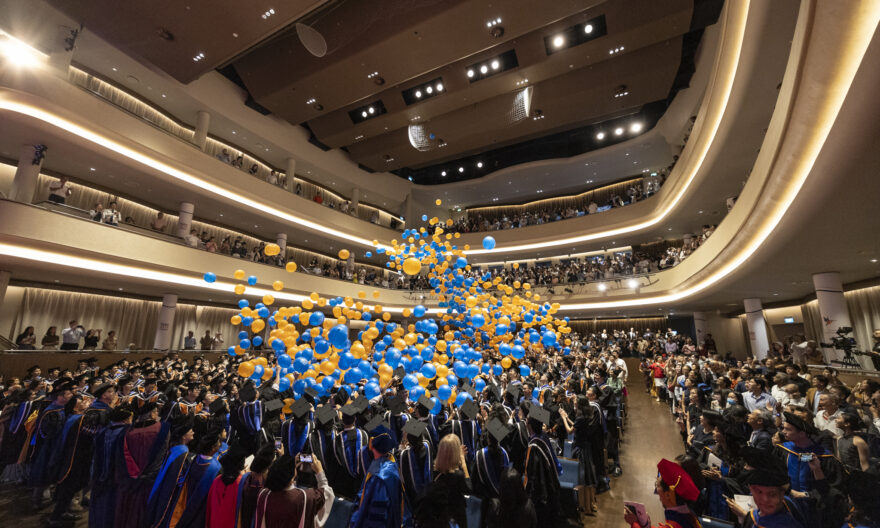On-campus makerspace inspires creative projects across disciplines
Yale-NUS students receive in-person guidance to create exhibitions, installation artwork, and curriculum materials at the Fabrication Studios
When Yale-NUS alum Reni Chng (Class of 2021) started on their Physical Sciences capstone project as a final-year student at Yale-NUS College, they envisioned building an interactive exhibit that would teach users about solar energy. But Reni had near-zero experience in the materials necessary to construct the project. At the recommendation of their capstone advisor, Assistant Professor of Science (Physics) Ben Andrew Olsen, they brought their plan to the Fabrication Studios, a makerspace that supports students, faculty, and staff’s academic and co-curricular projects.
First launched in 2016, the Fabrication Studios house machines for woodworking, 3D printing, laser etching, and sewing, allowing the Yale-NUS community to bring their creative projects to life. Helming the Fabrication Studios are technicians from the ERT Makerspaces, Initiatives, Community and Exhibitions (MICE) team, who provide professional individualised guidance on each project.
Over a period of four months, Reni worked in the Fabrication Studios, more colloquially known as the ‘Fab Lab’, to construct the exhibit as part of their capstone thesis titled ‘We’re Running on Sunshine: Methods of Communicating the Physics of Solar Energy’, the first capstone project about science communication in Yale-NUS. The exhibit was constructed with aluminum profiles, plywood, light-emitting diodes (LEDs) and solar photovoltaic (PV) modules. Attached on the exterior were acrylic boards engraved with information about the physics of solar energy. The exhibit was situated outside the Fab Lab for public viewing from late-November to early-December 2021. Participants could view the exhibition and answer a short survey before and after to gauge the effectiveness of the exhibit in improving their knowledge of solar energy.
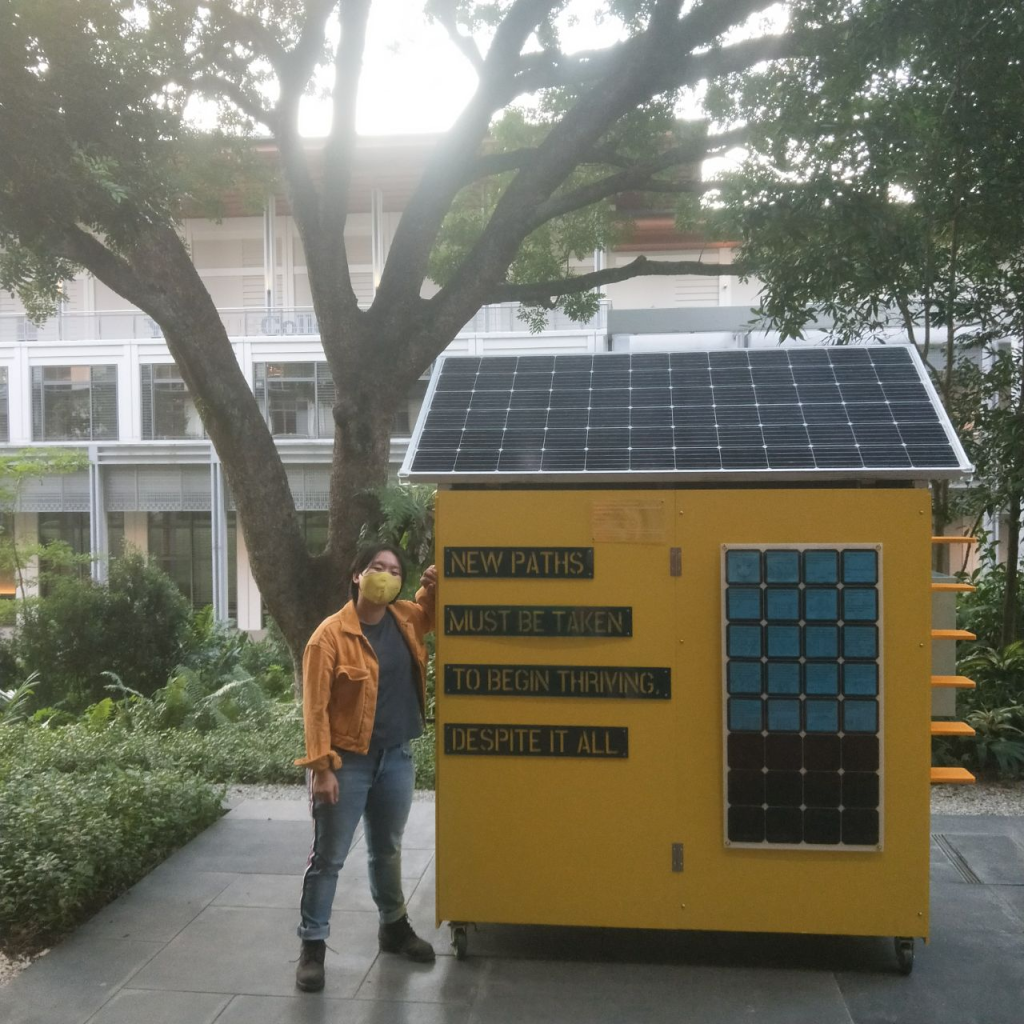 Reni Chng (Class of 2021) standing next to their exhibit. Image provided by Reni.
Reni Chng (Class of 2021) standing next to their exhibit. Image provided by Reni.
“I am incredibly thankful for the guidance of the Fab Lab staff, who provided me with advice from the initial stages of my project to the construction of each element. Without them, this project would not have been possible,” Reni said.
Since graduation, Reni’s interest in solar energy has inspired them to continue further studies in Science and Technology Studies (STS).
But the Fabrication Studios do not only result in large-scale projects like Reni’s. Lara Kine (Class of 2024) used the facilities at the Fabrication Studios to create an artwork for her Installation Art class.
The installation artwork is a re-creation of two ancient board games, the Royal Game of Ur and Senet. Inspired to create an art exhibition through the lens of a fictional archeologist, Lara wanted to use the artwork to showcase how modern-day technology could interact with ancient games.
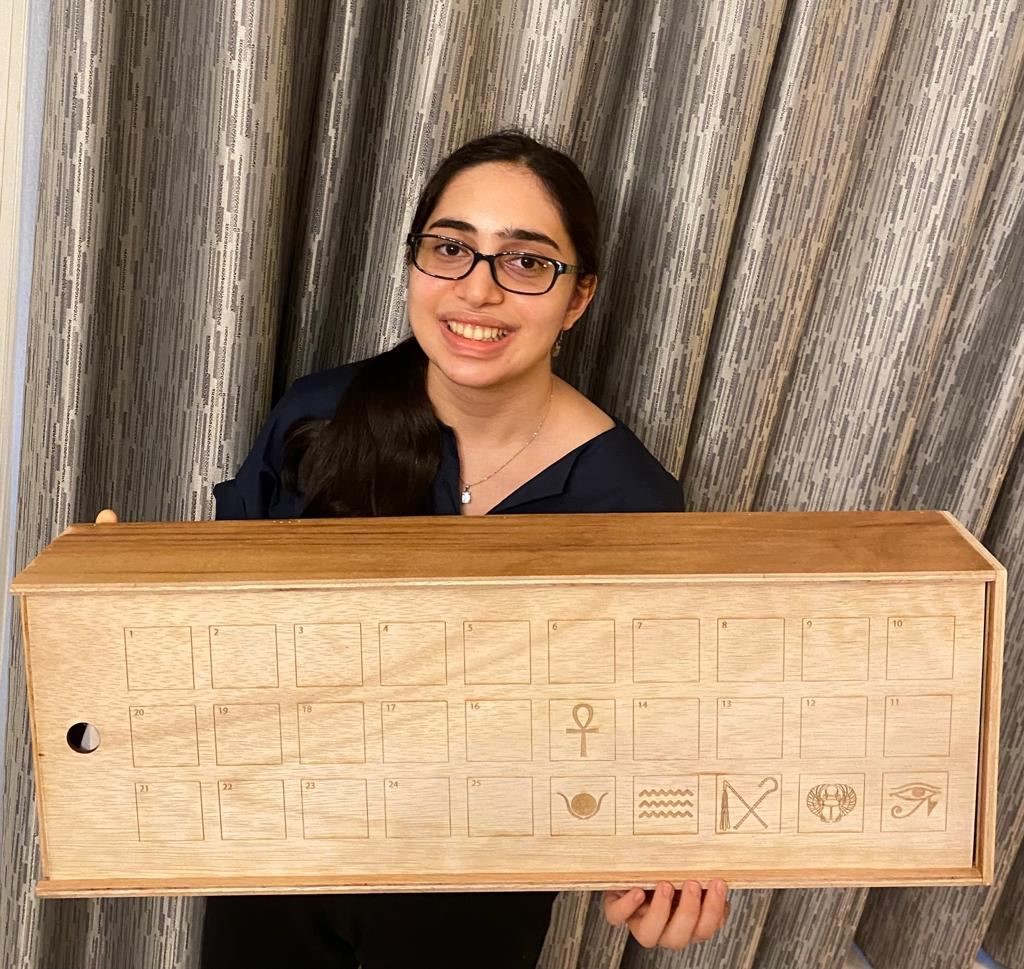 Lara Kine (Class of 2024) and part of her installation artwork, a re-creation of the ancient board game Senet. Image provided by Lara.
Lara Kine (Class of 2024) and part of her installation artwork, a re-creation of the ancient board game Senet. Image provided by Lara.
The Royal Game of Ur is an ancient Mesopotamian board game. According to some sources, it is the world’s oldest board game. It is considered an early precursor to Backgammon and other similar strategy games. Senet is an ancient Egyptian board game that mimics the movement of the five parts of the soul through the land of the dead.
The resulting creation, made of wood, required Lara to learn skills such as laser engraving, 3D printing, laser cutting, wood sanding, and lacquering at the Fabrication Studios. Along the way, she received creative suggestions from the Fab Lab staff, who guided her on planning the structure of the artwork and how to use the machines to construct the work from scratch.
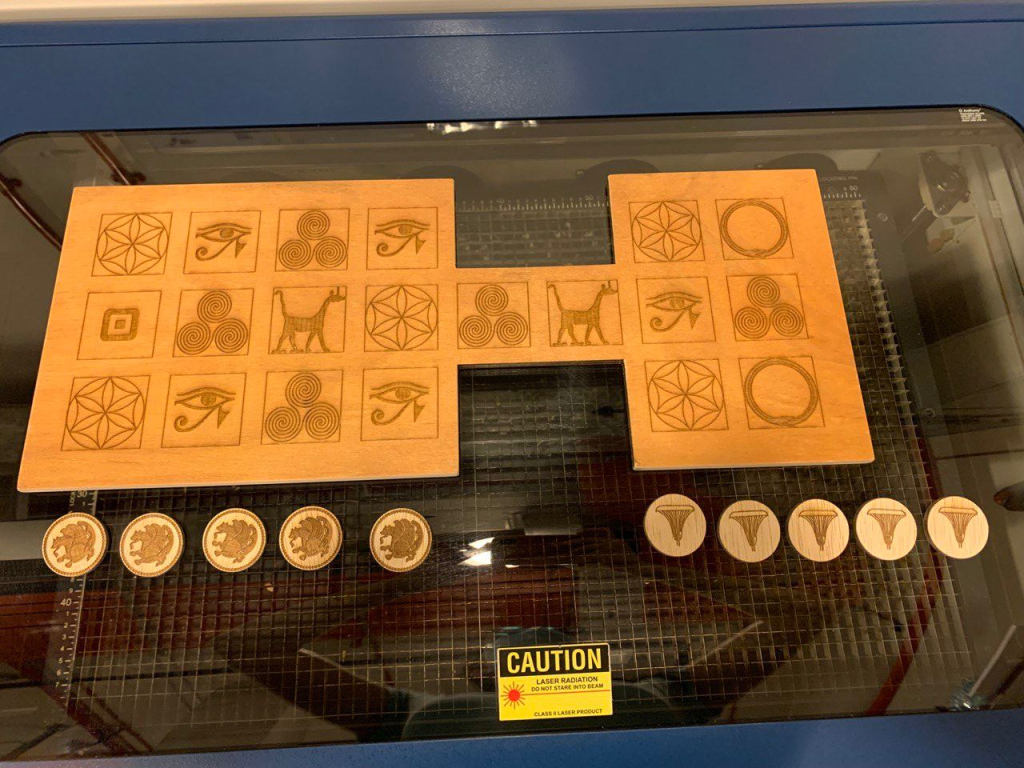 The second part of Lara’s installation artwork, a re-creation of the ancient board game The Royal Game of Ur. Image provided by Lara.
The second part of Lara’s installation artwork, a re-creation of the ancient board game The Royal Game of Ur. Image provided by Lara.
“I was only able to make my vision come to life through the aid of the Fab Lab staff,” Lara said. “Once I told them about my idea, they helped me break down the process into feasible steps while pointing out potential areas of concern so I could work around them as I created this art piece.”
Lara’s artwork was exhibited at the Georgette Chen Art Studios at the end-of-semester showcase for visual arts classes from 23 to 29 April 2022.
While Reni’s and Lara’s introduction to the Fabrication Studios were informal and project-based, there was one orientation session to the makerspace that piqued students’ interests in returning to work on future projects. Conducted on 2 February 2022, students from Yale-NUS College’s Introduction to Arts module were offered an orientation session to the Fabrication Studios. As part of the session, students worked with the technical team to create a personalised wooden phone stand using two crafting techniques: laser engraving and woodworking.
 Joseph Goh (right, Class of 2024) and other students from the Introduction to Arts module during their orientation to the Fabrication Studios. Image taken by Rachel Tey (Class of 2024).
Joseph Goh (right, Class of 2024) and other students from the Introduction to Arts module during their orientation to the Fabrication Studios. Image taken by Rachel Tey (Class of 2024).
For Joseph Goh (Class of 2024), a student pursuing a minor in Arts & Humanities, this session provided him with a clearer understanding of the Fabrication Studios’ facilities. “Given how the Fab Lab contains heavy-duty metal and woodworking equipment such as 3D printers and laser engravers, I was under the impression that the Fab Lab was made for engineering enthusiasts,” he said.
“But those misconceptions around the Fab Lab’s high barrier to entry were dispelled immediately during the session we had. It was really empowering to see how art could be created even with more technical materials like wood, metal, and plastic,” Joseph added.
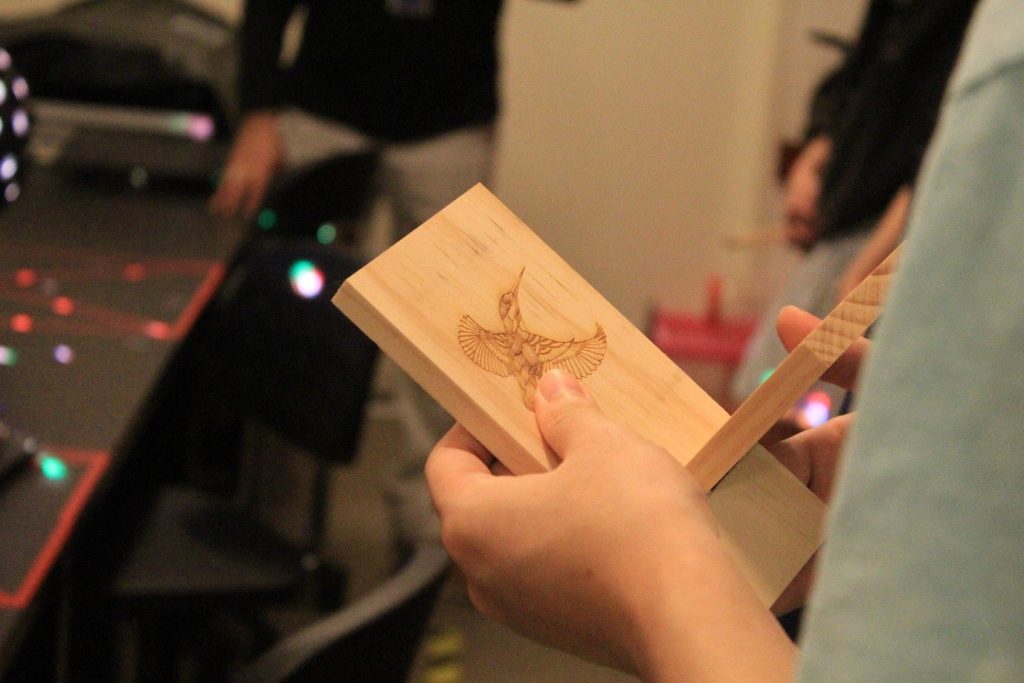 A personalised wooden phone stand created during the Introduction to Arts students’ orientation around the Fabrication Studios. Image taken by Rachel Tey (Class of 2024).
A personalised wooden phone stand created during the Introduction to Arts students’ orientation around the Fabrication Studios. Image taken by Rachel Tey (Class of 2024).
To Sundarimaa Erdembileg (Class of 2024), this tour provided her with new ideas on the creative projects she could embark on in the Fabrication Studios. As she was not experienced in crafts, she was worried she would make mistakes in her project.
“To my surprise, and especially thanks to the support and guidance from the Fab Lab team, I picked it up easily, and was the first to finish sawing my phone stand! At the end of the session, I didn’t even realise we had spent basically the entire three hours of the class on this mini project, it all went by so quickly because of how interesting it was,” she said.
“There’s so much more to the Fab Lab than meets the eye. Everyone should drop by to explore the creative possibilities this space can offer,” Sundarimaa added.
Assistant Professor of Humanities (Art History) Nozomi Naoi, who taught the Introduction to Arts class said, “Our hands-on session and tour of the Fabrication Studios for the module created an opportunity for students to go back to the Lab for their own projects in the future. The Fab Lab is an integral part to our student experience, not only for the Arts and Humanities major but for everyone at Yale-NUS.”



